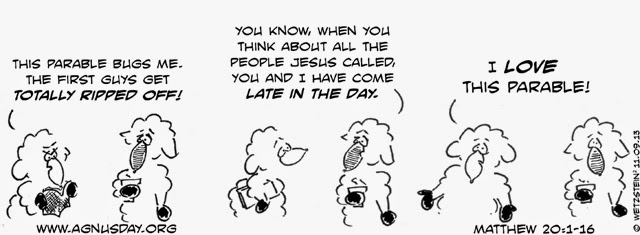
1. What stood out to me from this chapter?
This parable Jesus tells is an incredible picture of God's grace. Why? Because our world is SOOOO bent on earning and getting what we deserve. I'm sure when the workers all took a look at their pay at day's end, they all had different reactions. We don't see it, but I bet the ones who were hired late in the day were very grateful, as the pay was probably much more than they deserved. But the ones who had worked the longest felt liked they deserved more in comparison. When in fact, not only was the landowner fair in that he held up his end of the bargain, he was generous enough to hire them in the first place. He could have left them to fend for themselves. This is an incredible picture of God's grace. For Jews, this was a way for Jesus to help them see that God was full of grace to call the Jewish nation into a relationship with himself, but he was also going to be gracious to Gentiles in these later days, and give to them out of his goodness.
2. How does this passage relate to any other Scripture I know?
In verses 20-28, we here that James and John have requested to sit at Jesus's right and left hand in his kingdom. Jesus replies by explaining that his kingdom is not a normal kingdom. Whoever wants to be great should become a servant. This reminded me of when Jesus washed his disciples feet in the upper room in John 13. He showed the disciples what this meant and proved it with his own actions.
3. What does this mean for my life?
I was thinking about the parable again, and how if Jesus were to tell that parable to a group of Christians today, he probably wouldn't change anything. I think there are many Christians who go through life, faithful in their relationship with God, faithful in their church attendance and involvement, and faithful to serving others. But it's still really easy to look at someone who has lived a life full of sin, rebellion, reckless abandon, etc. but later in life comes to know Jesus Christ as Savior of their lives, and feel anger at God for letting them have the full blessing of salvation and grace and eternal life. Kind of like a modern day Jonah reaction. He was waiting for the fire from heaven to burn down on Ninevah, but God had given them another chance when they repented. I have to be careful of that, and rejoice instead when anyone turns to make Jesus the Lord of their life.
4. What questions do I have about this passage?
There are many times when Jesus speaks in parables so that it is hard even for the disciples to understand him. There are other times where he speaks almost in riddles. But in verse 17-19, Jesus tells the disciples EXACTLY what is about to happen. "Hey guys, so I'm going to be handed over to the religious leaders, mocked, tried, and crucified. But I will be raised to life on the third day." That is as clear as it gets. My question is, "WHERE WERE THE DISCIPLES ON THE THIRD DAY?" None of them were sitting around waiting for Jesus's resurrection. Mary and other women went to the tomb, but they were expecting a dead body. Was no one paying attention? Maybe they had their iPod headphones in and missed that part. I'm glad the disciples were really dense most of the time because then I don't feel quite so bad, like there's hope for me too. :)
In Christ,
Dan
image from http://www.agnusday.org/strips/Matthew20v01to16_2011.jpg


















